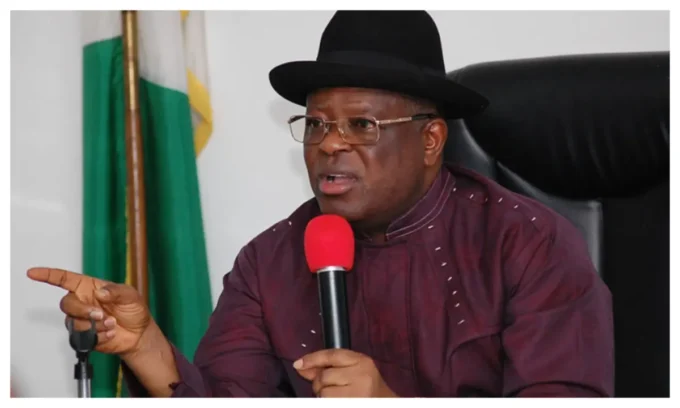Religious Harmony and Community Development Take Center Stage as Egba Central Mosque Embarks on Major Renovation

ABEOKUTA – In a significant display of community spirit and religious unity, former Nigerian President Olusegun Obasanjo called on Nigerians to embrace the ethos of charity, emphasizing that generous acts bring not only social benefits but divine rewards. Speaking at a high-profile event in Abeokuta on Friday, Obasanjo made his appeal at the unveiling of the renovation plans for the historic Egba Central Mosque and the construction of a new Islamic Centre at Kobiti, Abeokuta.
View Table of Contents
ToggleA Call for Collective Support Across Faiths
Addressing a gathering that included numerous dignitaries and community leaders, former President Obasanjo urged all Nigerians, irrespective of religious affiliations, to view the mosque remodelling as a shared project for the betterment of society. “Charity transcends religion. This project is a call for unity and a chance for all of us to contribute towards a lasting legacy,” Obasanjo stated.
His plea resonates deeply within a country known for its cultural diversity and, at times, religious tensions, where such collective communal efforts are vital to fostering harmony. The project aims to restore an important symbol of faith while stimulating local development.
Governor Dapo Abiodun of Ogun State, represented by his deputy Noimot Salako-Oyedele, described the initiative as a landmark achievement for the Egba people, particularly their Muslim population. The state government has committed to the project, promising to build the mosque’s administrative block and a library to support religious education and community activities.
Also read: Fireboy DML Opens Up: “I’ve Never Really Been Heartbroken”
Broad-Based Support from Nigerian Leaders
The Egba Central Mosque project has attracted wide-ranging support from Nigeria’s prominent leaders and wealthy philanthropists, showcasing a rare example of cross-sectional collaboration. Among the notable contributors are the Sultan of Sokoto, Alhaji Sa’ad Abubakar, the Alake and Paramount Ruler of Egbaland, Oba Adedotun Gbadebo, former Ogun State Governor Senator Ibikunle Amosun, and former Sokoto State Governor Aliyu Wammako.
Other major supporters include distinguished figures such as Chief Kessington Adebutu, Chief Rasaq Okoya, Secretary-General of the Supreme Council for Islamic Affairs Professor Ishaq Oloyede, as well as respected community patrons like Iya Suna of Egbaland, Alhaja Yemi Kolapo, and Senator Shuaib Salisu. Their contributions reflect a growing nationwide recognition of the mosque’s cultural and spiritual value.
The Sultan of Sokoto, during the unveiling of the mosque’s architectural prototype, vowed to personally reach out to influential Nigerians beyond Ogun State to raise further funds, underscoring the mosque’s national significance.
Comprehensive Plans and Community Impact
The scope of the transformation is impressive and goes beyond mere refurbishment. According to the Egba Muslim Council, which is spearheading the project, plans include the renovation of the mosque itself and the addition of several vital facilities: an administrative block, a library, a Quranic Academy, a multipurpose social hall, an Imam’s residence, a shopping complex, a medical center, and a guest house.
These expansions are designed not only to enhance religious practice but also to provide social and economic benefits for the local community. The project stands as an example of how spiritual centers can serve as hubs for education, commerce, and healthcare.
Aslo read: Portable Remanded in Prison After Failing to Meet Strict Bail Terms in Defamation Case
To accommodate the extension, the project committee, under the leadership of Abdulhakeem Tunji-Kalejaiye, announced that 78 houses in the vicinity of the central mosque at Kobiti will be demolished. Those affected will receive new housing on a 22-acre plot in the Sodeke-Titun Sabo area of Abeokuta, ensuring that no families are left homeless.
Preserving Religious and Cultural Heritage
The Alake of Egbaland, Oba Adedotun Gbadebo, reflected on the mosque’s deep historical roots and the urgent need for its upgrade. He emphasized that the project is key to preserving the religious and cultural heritage of the Egba people for generations to come.
This ambitious initiative, supported vigorously by community leaders and state officials alike, poignantly symbolizes the intertwining of faith, tradition, and modern community needs. As the project gains momentum, it stands as a landmark of religious tolerance and community development in Nigeria.
Latest Posts
Popular Fuji Musician Taye Currency Opens Up About Heavy Loss in CBEX Investment #CBEX Video
In a revealing and emotional video, renowned Fuji artiste Taye Currency shared...
6 days AgoRenewed Herdsmen Violence Rocks Benue Community: Residents Cry Out for Government Help
Suspected killer herdsmen has again invaded Gbagir community of Ukum Local Government...
6 days AgoFireboy DML Opens Up: “I’ve Never Really Been Heartbroken”
Nigerian singer, Adedamola Adefolahan, popularly known as Fireboy DML, has claimed that...
1 week AgoPortable Remanded in Prison After Failing to Meet Strict Bail Terms in Defamation Case
Controversial singer, Okikiola Badmus popularly known as Portable, has been remanded in...
1 week Ago












Leave a comment